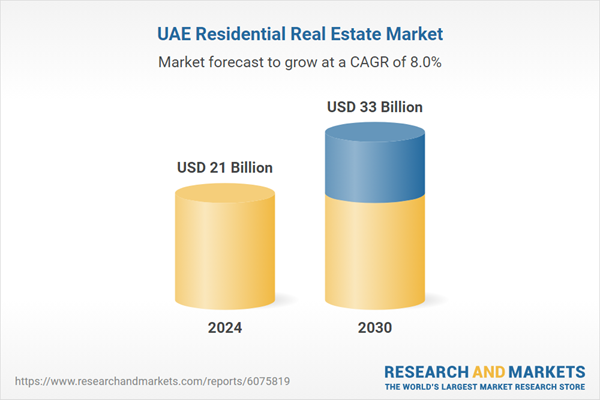Dublin, Oct. 29, 2025 (GLOBE NEWSWIRE) -- The "UAE Residential Real Estate Market, By Region, Competition Forecast & Opportunities, 2020-2030F" report has been added to ResearchAndMarkets.com's offering.
The UAE Residential Real Estate Market was valued at USD 2024 in 21 Billion, and is expected to reach USD 33 Billion by 2030, rising at a CAGR of 8.01%.
Residential real estate in the UAE encompasses housing properties designed for living purposes, including apartments, villas, townhouses, and condominiums. This market is influenced by a variety of factors such as economic growth, government policies, infrastructure development, and demographic shifts. 
With both new constructions and resale properties forming the core segments, the market is driven by growing population needs, foreign investor interest, and evolving consumer preferences for modern living spaces. The sector includes transactions such as home purchases, rentals, and long-term leases, supported by real estate agencies and financing institutions.
Urban hubs like Dubai and Abu Dhabi have seen heightened residential development activity, fueled by diversification of the economy, demand for quality housing, and increased expatriate inflows. As the UAE continues to focus on sustainable growth and smart infrastructure, the residential segment is expected to expand further, supported by government reforms and ongoing urbanization.
Key Market Drivers
Economic Growth and Diversification
The UAE's transition to a diversified economy has been a major catalyst for the residential real estate sector. Moving beyond its traditional dependence on oil, the country has invested heavily in tourism, finance, real estate, and technology, fostering a stable and attractive environment for both residents and global investors.
Strategic government initiatives, including infrastructure expansion and the establishment of business-friendly free zones, have enhanced the UAE's global appeal. These efforts have led to an influx of expatriates and professionals, especially in metropolitan areas like Dubai and Abu Dhabi, increasing the demand for quality housing.
The successful hosting of international events, such as Expo 2020, and the rise of short-term rental demand have also supported residential property investments. As the country continues to attract foreign businesses and residents, real estate remains a preferred asset class for long-term investment and rental income opportunities.
Key Market Challenges
Oversupply of Properties and Market Saturation
The UAE residential real estate market faces a key challenge in the form of oversupply, particularly in urban areas such as Dubai. A surge in construction over the past decade has led to an abundance of residential units, resulting in heightened competition among developers and a mismatch between supply and demand.
This surplus has caused downward pressure on property prices and rental yields, with many units remaining vacant or selling below market expectations. Developers often introduce incentives - like flexible payment plans or reduced service charges - to attract buyers, yet absorption rates remain slow.
In high-density luxury segments, market saturation is even more pronounced, with limited differentiation between competing offerings. This abundance of similar products reduces urgency among buyers, extending sales cycles. Moreover, global economic uncertainties and cautious investor sentiment have further tempered the appetite for premium properties, especially among international buyers.
Key Market Trends
Shift Towards Sustainable and Green Developments
Sustainability has become a defining trend in the UAE's residential real estate market. Developers are increasingly embracing green building practices in response to both consumer demand and national sustainability goals, such as the UAE Vision 2021 and the Dubai Clean Energy Strategy 2050.
There is a growing emphasis on integrating energy-efficient technologies, eco-friendly materials, and smart home systems into residential projects. Features such as solar panels, water-efficient systems, and intelligent lighting and HVAC controls are gaining traction. Additionally, green community planning - with landscaped open areas, parks, and rooftop gardens - is becoming a standard element in new developments. Certifications like LEED and Estidama are being pursued to enhance credibility and appeal to environmentally conscious buyers.
As awareness around climate change and environmental responsibility increases, sustainable living is moving from a niche preference to a mainstream expectation, influencing both design and marketing strategies in the residential segment.
Key Attributes:
| Report Attribute | Details |
| No. of Pages | 86 |
| Forecast Period | 2024 - 2030 |
| Estimated Market Value (USD) in 2024 | $21 Billion |
| Forecasted Market Value (USD) by 2030 | $33 Billion |
| Compound Annual Growth Rate | 8.0% |
| Regions Covered | United Arab Emirates |
Report Scope:
Key Market Players
- Christie International Real Estate
- ColdWell Banker Real Estate Company
- Al Habtoor Group
- DLF Ltd
- Hochtief Corporation
- IJM Corporation Berhad
- Engel & Volkers AG
- Lennar Corporation
UAE Residential Real Estate Market, By Type:
- New Construction
- Resale
UAE Residential Real Estate Market, By Category:
- Flats & Apartments
- Individual Houses or Private Dwellings
- Condominium
- Townhouses
- Others
UAE Residential Real Estate Market, By Mode:
- Online
- Offline
UAE Residential Real Estate Market, By Region:
- Dubai
- Abu Dhabi
- Sharjah
- Rest of UAE
For more information about this report visit https://www.researchandmarkets.com/r/4x2f7g
About ResearchAndMarkets.com
ResearchAndMarkets.com is the world's leading source for international market research reports and market data. We provide you with the latest data on international and regional markets, key industries, the top companies, new products and the latest trends.
Attachment
